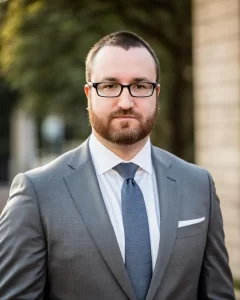Fred Walker
Debt Recovery Lawyer
Fred E. Walker | Austin Consumer Bankruptcy Attorney has helped more than 30,000 people file for personal or consumer bankruptcy over the past 30 years. Mr. Walker is a board-certified bankruptcy specialist, having first been certified in Consumer Bankruptcy Law by the Texas Board of Legal Specialization in 1989. Mr. Walker has practiced in this field for over thirty years. Mr. Walker obtained his Bachelor of Business Administration from the University of Texas in Austin in 1978 and graduated from Texas Tech University School of Law in 1983.
Fred Walker is a member of the American Bankruptcy Institute, National Association of Consumer Bankruptcy Attorneys, the College of the State Bar of Texas, Texas State Bar Association, Travis County Bar Association, and the Bankruptcy Section of the Austin Bar Association. He is admitted to practice in all Texas Courts; the United States Bankruptcy Court for the Western District of Texas, the United States District Court for the Western District of Texas, the 5th Circuit Court of Appeals, and the United States Tax Court.
He has handled numerous matters throughout the state involving bankruptcy, reorganizations, and resolution of tax deficiencies, representing primarily debtors, but also representing creditors, trustees, and other interested parties. A substantial portion of his practice is devoted to the representation of individual debtors in consumer bankruptcy proceedings and resolving tax collection matters, and he has successfully represented over 30,000 people during his career.
Mr. Walker is rated Excellent by AVVO, one of the leading websites where consumers go to find information about lawyers, has a five star-client rating on Google, and was designated a Super Lawyer in 2020.
Mr. Walker has written articles on the following topics: “Bankruptcy and Personal Exemptions”; Comparison of Texas State Exemptions and Federal Bankruptcy Exemptions”; “Representing the Debtor in Consumer Bankruptcy Cases”; “Defending Against Debts and Judgments”; “Defending Against Real Estate Foreclosures and Repossession of Consumer Goods”; “Defending Against Unfair Debt Collection Practices”; “Problems in Pre-Judgment Repossessions and Collections”; “Lender Liability for Violations of the Texas Constitutional Protections Regarding Home Equity Lending in Texas; “Fraudulent Transfers in Bankruptcy”; “Chapter 7 Bankruptcy”; “Chapter 13 Bankruptcy”; and Application of the Texas Construction Trust Fund Act and Bankruptcy”.
J. Mike Ross
Debt Recovery Lawyer
Over Mike’s 30+ year, exceptionally successful career, he has developed uniquely effective, long-proven methods and techniques designed to stabilize, increase, preserve and protect more successful cash flow for Miller, Ross & Goldman Clients. Unlike most competing commercial collection firms, Miller, Ross & Goldman consistently and dramatically increases our Clients’ cash flow from past-due A/R, while still bridging and elevating long-standing business relationships, when possible.
As a highly sought-after, commercial debt collection industry top-performer in his early career, Mike became frustrated with the cookie-cutter mentality and poorly developed strategies utilized by most commercial collection firms, including some of the industry’s biggest players. Many of the most commonly utilized, routine tactics were professionally unbecoming, often wholly inconsistent and even contrary to client reputations and business relationship considerations. The lack of a thorough and thoughtful analysis of each situation meant that the potential for a truly effective, fact-based, tactical approach too-often gave way to an immediately unproductive, often unnecessarily hostile and unproductive exchange. Consequently, so many potentially promising or long-standing business relationships that may have otherwise been justifiably redeemed, bridged, maintained or salvaged, were carelessly laid to waste. Mike simply could not abide by these unprofessional, short-sighted tactics, which still perpetuate today. Mike also had no desire to invest his professional aspirations in a career path lacking the core, and principled pursuit of “win-win” outcomes for good people on both sides of the equation.
So, in 2000, together with two highly experienced and like-minded industry colleagues, Mike launched Miller, Ross & Goldman with the goal of developing an operational framework based on timeless, core principles of fairness, honesty, integrity and unwavering professionalism. Over 25 years and now more than 5000 clients strong, Miller, Ross & Goldman has become a global industry leader, earning high praise and accolades from Fortune 500 companies to small businesses all over the U.S. and abroad. Our phenomenal, unmatched collections performance for our highly valued Clients has cemented long-standing business relationships with so many incredible people, whom we’re privileged to know and whose companies we’re honored to protect and serve.
Susan G. Taylor
Debt Recovery Lawyer
Ms. Taylor received her Bachelor of Science degree with honors from the University of Texas at Tyler in 1977, Master’s in Education from Stephen F. Austin State University in 1979, and law degree from the University of Houston in 1984. After a one-year appointment as briefing attorney for the Sixth Court of Appeals of Texas, she pursued a legal career in Central Texas, where she has remained.
Ms. Taylor has extensive experience in the fields of bankruptcy, tax, and healthcare law. She is a member of the College of the State Bar of Texas; Bankruptcy, Healthcare, and Real Estate/Probate/Estate Planning sections of the State Bar; and state and local bar associations. Ms. Taylor served for more than 20 years as a weekly contributing editor to the State Bar’s “Texas Lawyers’ Digest” and volunteers regularly for pro bono work through Volunteer Legal Services.
Michael Baumer
Debt Recovery Lawyer
Michael has practiced bankruptcy law almost exclusively for over 35 years, beginning at a bankruptcy firm while still in law school. He has been licensed to practice law in Texas since 1984, and has been board certified in both consumer and business bankruptcy law by the Texas Board of Legal Specialization since 1998 – he is one of about 50 attorneys to have both certifications. He has assisted in drafting legislation, including the Texas law that protects retirement accounts from creditors. In addition, he served five terms as president of the Austin Bankruptcy Bar Association and served on its governing council for over 15 years. He is a frequent speaker on bankruptcy-related topics.
Michael worked at a large downtown Austin firm for ten years where he represented creditors and the federal government in bankruptcy cases. He started his own practice in 1997 focusing on debtor representation.
Michael grew up in Michigan, Ohio, Oklahoma and Delaware before finally landing in Texas when he was 13. He paid for college by working in construction, at a refinery in Port Arthur and at a shipyard in Orange, Texas, and then as a grocery store manager (which was considerably less messy). He has one son, who is in the US Navy.
Kevin Bennett
Debt Recovery Lawyer
Kevin Bennett was born and raised in Austin, Texas and graduated from the University of Texas at Austin with a degree in Economics. As a member of his Fraternity, Mr. Bennett held numerous leadership positions, including serving as the chapter’s philanthropy chair, where he earned the Fraternity’s National Humanitarian award for his leadership and service work. Assisting and advocating for others in times of need has always been important to Mr. Bennett.
Mr. Bennett earned his law degree at The South Texas College of Law in Houston, Texas. In 2005, U.S. News & World Report ranked the Trial Advocacy Program at South Texas number one in the nation, and it consistently ranks among the top 10 every year. During law school, Mr. Bennett spent time working for the Honorable Judge Jim York of the 246th District Court of the State of Texas. During this time, Mr. Bennett developed a passion for the practice of law and a true devotion for wanting to help those in need of legal assistance.
Mr. Bennett defends individuals who are facing criminal charges stemming from DWI, assault, theft, drug possession and various other misdemeanors and felony crimes in Austin, Texas. Mr. Bennett takes the defense of his clients very seriously and will work tirelessly to tailor a defense to every case. Mr. Bennett strives to treat each case as though it were his own and to make each client feel like they are his only.
Mr. Bennett is a member of the State Bar of Texas, Texas Criminal Defense Lawyers Association, the Austin Criminal Defense Lawyers Association, NORML, and the Better Business Bureau of Travis County. Mr. Bennett is also a member of The National College of DUI Defense and DUI Defense Lawyer’s Association.
Recently, Lawyer Bennett was elected to be a Fellow of the Texas Bar Foundation. Fellows of the Foundation are selected for their professional achievements and have demonstrated a commitment to the justice system throughout the State of Texas.
In his spare time, Mr. Bennett enjoys spending time with family, attending sporting events, fitness, travel, being outdoors, and the performing arts. Mr. Bennett also serves on his Church’s Mission Committee.
William B. Gammon
Debt Recovery Lawyer
William B. “Bill” Gammon was born in Virginia and moved to Texas as a young child when his father went to work for NASA. He attended High School in Clear Lake, Houston and then came to Austin during the 1960’s to complete his under graduate degree at The University of Texas. He ran several successful small businesses both in Austin and in Houston before deciding to attend Law School. He attended UT Law School in Austin and holds the record there for the fastest graduating student. He completed Law School in just twenty two months.
Bill began his solo practice here in Austin in 1987 and now specializes in Real Estate Law, Foreclosure and Evictions, Business Law, Bankruptcy, Personal Injury, Wrongful Death and Medical Malpractice.
His interests and hobbies include traveling, reading, scuba diving, sky diving, politics, piloting small aircraft and helicopters and absolutely anything connected to gizmos and gadgets.
Education
- The University of Texas School of Law, Austin, Texas
- Juris Doctor
- The University of Texas
- B.A., Bachelor of Arts
- Major: Philosophy
Paul A. Batrice
Debt Recovery Lawyer
As the founder and Managing Partner of Batrice Law Firm, Paul Batrice has spent the past fifteen years fighting on behalf of ordinary people and aggressively pursuing just compensation for injured Texans. Over the course of his career, Paul has helped thousands of people obtain millions of dollars in settlements and judgements.
While in law school, Paul was heavily recruited by high-ranking firms in Miami, New York, and Dallas. As a result, he gained experience defending some of the largest companies in the world. His goals in the legal field never aligned with the corporate interests of these companies, however, which led him to the work he does today – representing those in need from the great state of Texas.
Paul graduated in the top of his class from Oklahoma City University School of Law. During his time at OCU, he stayed busy as a distinguished member of the Mock Trial Team and led the school’s chapter of Phi Alpha Delta. He went on to become a District Justice and mentor young lawyers.
EDUCATION
- Oklahoma City University School of Law, Oklahoma City, Oklahoma
- J.D.
HONORS
- Named Top 10 Criminal Law Attorney by “Best of the Best Attorneys”
- Recognized in Excellence by “Lawyers of Distinction”
- Elected as a Lifetime Fellow of the “Texas Bar Foundation”
- Recognized in the Multi-Million Dollar Advocates Forum
- Recognized as a Top 100 Trial Lawyer by “National Trial Lawyers”
- Batrice Law Firm is Accredited by the “Better Business Bureau”
Tyler Hickle
Debt Recovery Lawyer
I am a consumer law attorney located in Austin, Texas. I take cases in most of Central Texas. I can help people who are dealing with abusive debt collectors. The most common forms of abuse by debt collectors are:
- Collecting too much money / collecting more money than owed,
- Disclosing confidential information to third parties, and
- Misleading debt collection letters.
I have been a lawyer since 2009. I practice in both state and federal courts
What is the statute of limitations for debts in Texas?
Understanding the statute of limitations for debts in Texas is essential for anyone grappling with financial obligations. This legal timeframe dictates how long creditors have to initiate a lawsuit to collect unpaid debts. In Texas, the statute of limitations generally spans four years, but the specifics can vary based on the type of debt involved.
What is the Statute of Limitations?
The statute of limitations is a law that sets a maximum period during which legal proceedings can be initiated. Once this period expires, creditors lose the right to sue for debt recovery, although the debtor still owes the money. In Texas, the statute of limitations for most types of debts is four years, as outlined in Section 16.004 of the Texas Civil Practice and Remedies Code.
Types of Debts and Their Limitations
- Credit Card Debt: The statute of limitations for credit card debt in Texas is four years. This means that creditors have four years from the date of your last payment or acknowledgment of the debt to file a lawsuit.
- Medical Debt: Similar to credit card debt, medical debts are also subject to a four-year statute of limitations. If you fail to pay a medical bill, the provider has four years to take legal action.
- Personal Loans: Unsecured personal loans follow the same four-year limitation. If you default on such a loan, creditors must initiate legal proceedings within this timeframe.
- Auto Loans: For auto loans, which are typically secured by the vehicle itself, creditors have four years from the date of default or last payment to pursue legal action.
- Mortgage Debt: Mortgage debts are also governed by a four-year statute of limitations in Texas. If you default on your mortgage payments, lenders must act within this period to recover their losses through foreclosure or other means.
When Does the Clock Start Ticking?
The clock for the statute of limitations generally starts ticking from the date of your last payment or acknowledgment of the debt, known as the “date of default.” For example, if you made your last payment on a credit card in January 2020, creditors would have until January 2024 to file a lawsuit against you.However, it’s important to note that making a partial payment or acknowledging the debt can reset this clock. This means that if you make any payment or write a letter acknowledging that you owe money, you could inadvertently extend the timeframe during which creditors can sue you.
What Happens When Time Runs Out?
Once the statute of limitations has expired, creditors can no longer file lawsuits to collect on that debt. This condition is referred to as “time-barred” debt. While creditors may still attempt to collect through phone calls or letters, they cannot pursue legal action against you in court.
Implications for Debtors
Understanding that a debt is time-barred is crucial for managing financial obligations effectively:
- You Still Owe the Debt: Even if a debt is time-barred, it does not mean that you no longer owe it. Creditors can still contact you and request payment.
- Impact on Credit Reports: Time-barred debts may still appear on your credit report for up to seven years from the date of default. This can negatively impact your credit score and ability to secure new credit.
- Legal Defense: If a creditor attempts to sue you for a time-barred debt, you can raise this as a defense in court. It’s essential to provide evidence that demonstrates when your last payment was made or when you acknowledged the debt.
The Role of Debt Collectors
Debt collectors must adhere to legal guidelines when attempting to collect outstanding debts. If they pursue legal action on time-barred debts, they risk having their case dismissed by the court. Therefore, it’s crucial for collectors to accurately calculate whether they are within their rights to sue based on the statute of limitations.
Consumer Rights
Consumers have specific rights under federal and state laws regarding debt collection practices:
- Fair Debt Collection Practices Act (FDCPA): This federal law protects consumers from abusive practices by debt collectors and allows them to dispute debts they believe are not valid or time-barred.
- Texas Finance Code: In Texas, Section 392.307 prohibits debt buyers from initiating actions against consumers after the expiration of applicable limitations periods.
If you find yourself being pursued for an old debt or facing aggressive collection tactics, consulting with an attorney familiar with consumer rights can be beneficial.
Strategies for Handling Old Debts
If you have old debts that may be time-barred:
- Do Not Make Payments: Making payments on time-barred debts can reset the statute of limitations clock and give collectors another opportunity to sue.
- Seek Legal Advice: Consulting with an attorney can provide clarity about your rights and options regarding old debts.
- Negotiate Settlements: In some cases, negotiating with creditors may lead to settlements for less than what is owed, even if they cannot legally sue you.
- Request Verification: If contacted by a collector about an old debt, request verification in writing before making any decisions regarding payment.
Conclusion
Navigating debts and understanding the statute of limitations in Texas is crucial for protecting your financial rights. With most debts subject to a four-year limit before creditors lose their ability to sue, being informed about when this period starts and how it can be affected by payments or acknowledgments is vital. Whether you’re dealing with credit card debt, medical bills, or personal loans, knowing your rights can empower you in managing your financial obligations effectively and confidently.












